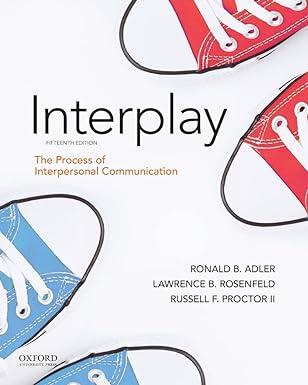Choose an important emotion you experience in one of your relationships. This relationship neednt be highly personal.
Question:
Choose an important emotion you experience in one of your relationships. This relationship needn’t be highly personal. You might, for example, focus on an employer, a professor, or a neighbor. Use the guidelines in Section 9.3 to determine whether and how you might express this emotion. Ask someone you know to give you feedback on the choice you made.
Data From Section 9.3:
A wide range of research supports the value of expressing emotions appropriately. Starting at a young age, the way parents talk to their children about emotions has a powerful effect on development. John Gottman identified two distinct parenting styles: “emotion coaching” and “emotion dismissing” (Lee, 2017). Research shows how the coaching approach gives children life skills for communicating about feelings, leading to much more satisfying relationships. In fact, children who grow up in families where parents dismiss emotions are at higher risk for behavior problems than those who are raised in families that practice emotion coaching (Young, 2009).
At the most basic physiological level, people who know how to share their feelings appropriately are healthier than those who don’t. Inexpressive people—those who avoid their feelings and impulses and deny distress—are more likely to suffer from a host of medical ailments (Quartana & Burns, 2010). However, people who are overly expressive also suffer physiologically. Even one five-minute episode of anger is so stressful that it can impair your immune system for more than six hours (Thaik, 2014). One key to health, then, is to learn how to express emotions constructively.
The suggestions that follow can help you decide when and how to express your emotions. Combined with the guidelines for self-disclosure, they can improve the effectiveness of your emotional expression.
Step by Step Answer:

Interplay The Process Of Interpersonal Communication
ISBN: 9780197501344
15th Edition
Authors: Ronald B. Adler, Lawrence B. Rosenfeld, Russell F. Proctor II





